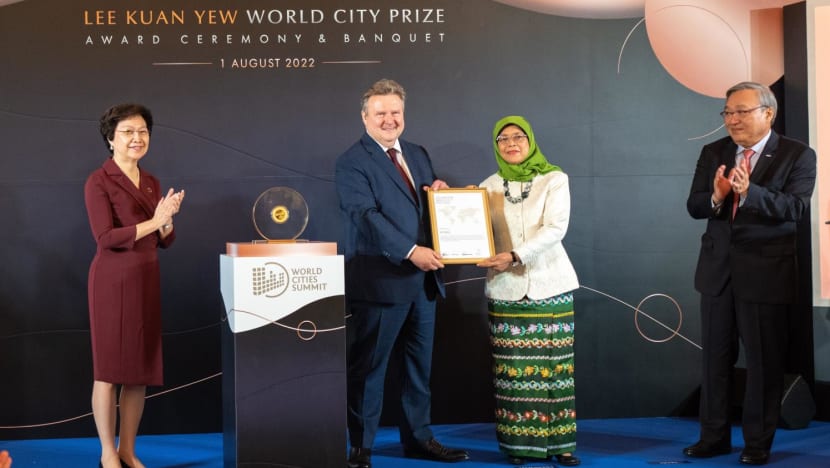Lee Kuan Yew World City Prize 2020 presented to city of Vienna

President Halimah Yacob presents the Lee Kuan Yew World City Prize 2020 to Dr Michael Ludwig, mayor and governor of Vienna, Austria. (Photo: MND)
SINGAPORE: The Lee Kuan Yew World City Prize 2020 was presented to the city of Vienna on Monday (Aug 1) by President Halimah Yacob.
The award recognised Vienna, Austria’s capital, for having sustained the “highest quality of life” for its people, said the Urban Redevelopment Authority and the Centre for Liveable Cities in a joint press release.
“By planning ahead and making sustained efforts to address the challenges of climate change, the city has successfully built, innovated and enhanced its infrastructure to meet modern needs whilst retaining its distinctive identity as a capital of culture, music and history,” the press release read.
The mayor and governor of Vienna, Dr Michael Ludwig, received the prize on behalf of the city at the prize award ceremony and banquet held at the Istana on Monday night.
The Lee Kuan Yew World City prize is jointly organised by URA and the Centre for Liveable Cities. It honours “outstanding achievements and contributions” to creating liveable, vibrant and sustainable communities around the world.
In a press release in March announcing Vienna’s win, nominating committee chairman Dr Cheong Koon Hean said: “Even as the world faces a climate emergency, Vienna is an exemplar of responsible environmental stewardship for its region.
“It has been remarkably successful in sustaining a high quality of life for its inhabitants, through steadfast improvements and innovative digital technology. Vienna holds many lessons for us as it has met the needs of modern society in a sustainable way, while retaining its attractiveness and charm as a city of history and culture.”
Vienna’s environmental stewardship was one of the model strategies highlighted by the committee in presenting the prize to the city.
The city has taken “consistent and far-sighted” climate action to address and mitigate the impact of climate change, the committee said in a press release in March.
For example, it set out plans to create more open and green spaces that can contribute to reducing the urban heat island effect.
Vienna also promoted liveable and healthy communities, as well as strong citizen and stakeholder engagement.
The city embarked on large urban redevelopment projects, creating new urban centres where residents are connected to their workplaces and “recreation nodes” by active mobility networks and an extensive network of public transport options, the press release said.
“This has encouraged a shift towards more eco-compatible modes of commuting around the city, such as walking, cycling, and public transport.”
Three other cities were also recognised as special mentions for the prize: Antwerp in Belgium, Boston in the United States and Portugal’s capital Lisbon.














